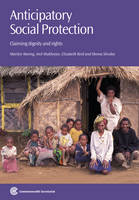Anticipatory Social Protection:
Claiming dignity and rights
Marilyn Waring, Anit N. Mukherjee, Elizabeth Reid and Meena Shivdas
Book Review
 Concerns and subjects among development practitioners and academics come and go, but social protection is a topic that has remained consistently present. Equally persistent has been the vagueness of its meaning, despite its concrete – policy relevant – nature. This book helps in remedying this lack of clarity, and provides a clear conceptual understanding of ‘social protection’. More importantly, it offers an understanding that is comprehensive (through the inclusion of the issues of rights and care, and an emphasis on the life cycle), and that is illustrated by examples from country and regional level.
Concerns and subjects among development practitioners and academics come and go, but social protection is a topic that has remained consistently present. Equally persistent has been the vagueness of its meaning, despite its concrete – policy relevant – nature. This book helps in remedying this lack of clarity, and provides a clear conceptual understanding of ‘social protection’. More importantly, it offers an understanding that is comprehensive (through the inclusion of the issues of rights and care, and an emphasis on the life cycle), and that is illustrated by examples from country and regional level.
There are things that would enhance the book further. One would be the inclusion of a justification for the book’s overall structure, which remains unclear, and a summary of its contents at its beginning, not only at its end. The book would also have benefited from a clearer background to, and explanation of, the Social Protection Floor Initiative, the critique of which is central to this work.
The framework that emerges from this critique is built gradually, firstly by highlighting how human rights ‘with women at the centre’ allow for the inclusion of ‘dignity, social justice and unpaid care more firmly in the policy making domain’ (p. 8); secondly, by spelling out the three sets of rights (economic, political and social) that make the framework transformative; and finally by explaining the ‘anticipatory‘ element.The latter is linked primarily to the recognition that, from a gender perspective, such policy must anticipate the specific needs that emerge from the various forms of discrimination girls and women experience. Helpful illustrations of this are given later in the book, as, for example, when explaining that ensuring good nutrition for mothers is a more efficient approach than supporting other needs of mother and infants, and the already healthy. Another instance is that of contraception and family planning (in the Philippines and Asia more generally) as part of anticipatory, rather than merely reactive, public policy. Another key element of this framework is that it proposes that in practice it should involve all three rights holders and duty bearers: the state, the community and the individual.
One of the most useful aspects of the book is the central role given to unpaid care, and the case studies provided to illustrate this. Unpaid (and paid) care, and its almost universal association with women, has long been recognised by feminist analysts and activists as both the single most important cause of gender inequality, and the area of social and other policy least recognised and addressed. (There has recently been a revival of debates and explorations of the problem and its appropriate solutions, including the influential 2013 report by the UN Special Rapporteur on Extreme Poverty and Human Rights, which focused on women caregivers and the relationship between poverty and unpaid care.) References in the book to HIV/AIDS as it relates to care and more general social policy occur consistently in the African context, more selectively for Asia, and not at all for other regions.
The summaries of regional developments themselves are informative, but only some (for instance, that of the Caribbean) offer a really useful summary of what are complex trends in large and diverse geographical areas. However, the treatment of regional situations is particularly effective when used to illustrate concrete instances of the proposed anticipatory and transformative framework adopted in the book.
The issue of children and their rights and needs is present throughout the book, though some fundamental concepts could have been clarified at the beginning, rather than referring to them rather late on, as part of specific policy analysis. This is the case with the notion of agency, only dealt with explicitly on page 42, as part of the Swaziland case study.
Chapter 5, ‘The Carer’s Journey’, enriches the book by giving space to the long term experience of a carer, Elizabeth, who reflects on her own experience of caring and loss. The chapter situates Elizabeth’s experience analytically, in the context of the evolution of Australian social policies, and then, explains the ways in which the latter could be enhanced by an anticipatory and transformative understanding. Equally, if not more useful, would have been an early and more thorough review of the various meanings of social policy currently employed, as a guide for those to whom the issues are new.
The criticisms above aside, this book is a valuable addition to the literature on social protection and should help stimulate further debates in the field.
Review ©2014 Ines Smyth, Senior Gender Adviser, Oxfam GB, UK
Anticipatory Social Protection: Claiming dignity and rights is published by the Commonwealth Secretariat
Review originally published in Gender & Development 22.2 (2014)
